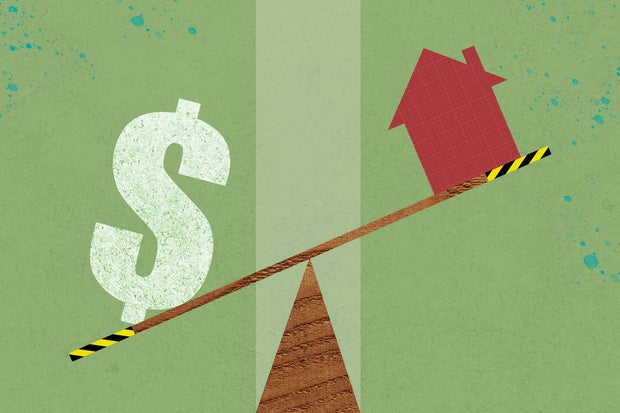 A home equity loan is a good borrowing tool in today's rate environment, and this option could even save you money in certain cases.
Getty Images
A home equity loan is a good borrowing tool in today's rate environment, and this option could even save you money in certain cases.
Getty Images
Today's high-rate environment and the rising cost of living are leaving many borrowers in a tough spot. Interest rates on credit cards are still sitting near record highs in mid-2025, after all, and with many households still feeling the pinch of inflation, borrowers may be looking for another way to get access to the funds they need without draining their savings.
With home equity at a record-high level, home equity loans may be an attractive way to borrow money at a lower rate than what is available with a credit card or personal loan. With a home equity loan, you borrow a portion of your home's equity via a lump sum loan with a fixed rate, which can offer both the funds you need and predictable monthly payments that won't change with the wider rate environment.
But while home equity loans can be a wise option to consider, they may be a better option in some cases rather than others. We spoke with three financial experts to find out situations where a home equity loan can save you money and some common pitfalls to watch out for.
Find out how affordable your home equity borrowing options could be now.
How a home equity loan could save you money now, experts say
According to experts, there are a couple of ways a home equity loan could help save you money right now, including:
Consolidating high-rate debt
"One of the strongest applications for a home equity loan is paying off high-interest credit card debt," says Ryan Whitcher, owner and CEO of Harmony Home Buyers.
By refinancing or consolidating your credit card debt with a home equity loan, you can move your debt from a high variable-rate option to a loan with a low fixed rate and repayment schedule. And, by doing so, you may also raise your credit score because you're lowering your credit utilization.
"Paying off debt at 20% APR with a 7% or lower fixed-rate home equity loan will save a borrower thousands of dollars in interest throughout the loan while folding a few payments into one," says Whitcher. "I've had borrowers save more than $500 a month by refinancing debt in this manner and freeing up cash flow to invest or create a reserve fund."
Compare your top home equity loan and HELOC borrowing options online here.
Increasing your home equity through improvements
Another way a home equity loan can save you money is by financing home improvements that directly increase your home's value.
"Tapping into your home equity through products like a home equity loan is one of the most cost-effective ways to fund home improvements," says Eduardo Berain, executive vice president of banking, investments and insurance at Frost Bank.
While home equity loans don't offer the same flexibility as a home equity line of credit (HELOC), the security that comes with the fixed monthly payment may give borrowers more peace of mind. Risk-averse borrowers may especially shy away from the HELOC to avoid any chance of a rate increase.
Home equity products offer lower interest rates than credit cards and personalized loans for the same reason as mortgages — they're secured by your home. That makes it easier to access the amount of money necessary for large renovations that can increase your home's value.
Another perk of using your home equity loan for home improvements is that the interest on home equity debt is only tax-deductible when used for home improvement projects that "buy, build, or substantially improve" your home, a once-temporary restriction made permanent with recent policy changes.
So if you're using your home equity loan for this purpose, you may get the combined benefits of a low fixed interest rate, an increased home value and a tax break.
How to decide if a home equity loan is the right option
According to Steven Glick, a licensed mortgage loan officer and director of mortgage sales at HomeAbroad, a home equity loan may be a good option if you have at least 1520% equity in your house, a stable job, and ideally a credit score of at least the mid-600s or higher.
"If you're using it for something that adds value or cuts costs long-term, go for it," says Glick. "For example, if your debt-to-income ratio is under 43%, and you can handle the payments without stretching, it's a green light. In this 2025 market, with home values still climbing in many areas, it's a smart time if you're planning ahead."
That said, Glick warns against using a home equity loan for luxury purchases or daily expenses. A home equity loan likely isn't the right option either if you have an unstable income, you're planning to sell your home soon or if doing so will require you to dip below 20% equity, according to Glick.
"Just because you can tap 80-90% equity doesn't mean you should," says Glick. "It reduces your home cushion and ramps up payments."
When it comes to shopping around for the best home equity loan, Glick recommends comparison shopping. Rates and fees vary between lenders, so choosing the wrong one could cost you. And don't just look at the interest rate — take closing costs, appraisals and potential prepayment penalties into account as well.
The bottom line
Rising home values have offered homeowners a unique opportunity to get their hands on some additional cash without resorting to high-cost borrowing options like credit cards and personal loans. In cases like high-rate debt consolidation or home renovations, home equity loans can even save you money, but they typically aren't ideal for covering immediate expenses. Experts recommend running the numbers for yourself to make sure your savings outweigh your costs in the long run and shopping around for the best rate and terms for your unique situation.


















































